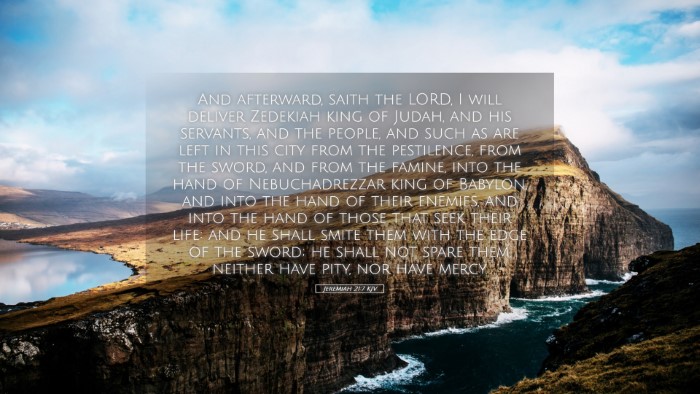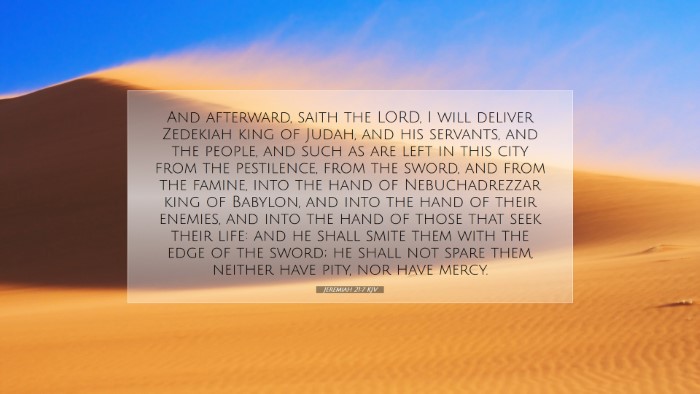Commentary on Jeremiah 21:7
Bible Verse: Jeremiah 21:7 - "And afterward, saith the LORD, I will deliver Zedekiah king of Judah, and his princes, and the people, and such as are left in this city from the pestilence, from the sword, and from the famine, into the hand of Nebuchadnezzar king of Babylon, and into the hand of their enemies, and into the hand of those that seek their life: and he shall smite them with the edge of the sword; he shall not spare them, neither have pity, nor have mercy."
Contextual Overview
This verse is situated within a critical juncture in the history of Judah, where the prophet Jeremiah delivers a message regarding the fate that awaits Jerusalem amidst the siege by Babylon. The dire situation is emblematic of God's judgment and the repercussions of idolatry and rebellion against divine authority. The chapter presents the culmination of a consistent biblical theme: the consequences of turning away from God.
Exegesis and Commentary
1. The Sovereignty of God: Jeremiah 21:7 emphasizes God's sovereignty over nations and rulers. As noted by Matthew Henry, “This prophecy serves to remind us that human authority is ultimately under divine oversight.” God's control is evident in the fate decreed for Zedekiah, signifying that divine will surpasses worldly powers.
2. The Role of Nebuchadnezzar: Albert Barnes elucidates that Nebuchadnezzar symbolizes not just an earthly ruler but also an instrument of God's judgment. Therefore, the reference to him indicates the simultaneous operation of divine justice and foreign dominion. God uses Nebuchadnezzar as a means to execute His divine will against a nation that has turned its back on Him.
3. The Judgement Pronounced: The reference to pestilence, sword, and famine speaks to a holistic approach to judgment. Adam Clarke emphasizes that “the triad of calamities presents a comprehensive view of the destruction awaiting the disobedient.” Each form of judgment serves to exemplify the severity of God’s reaction to sin, intertwining spiritual and physical consequences.
Theological Implications
1. Divine Retribution: This verse serves as a stark reminder of retributive justice. The consequences faced by Zedekiah and his people reflect a critical theological truth: disobedience to God results in suffering. The reference to the sword hints at violent retribution, encapsulating the prophetic vision of coming devastation.
2. The Call for Repentance: In context, Jeremiah's prophecy is not solely about destruction but also about an avenue for repentance. Henry notes that while judgment is inevitable, the call to turn back to God remains a poignant theme. “The grace of God does not vanish even in the face of His wrath,” suggesting a persistent invitation to redemption.
Practical Applications
- Understanding Consequences: For scholars and pastors, this passage encourages a deeper understanding of the consequences of sin, both corporately as a society and individually, fostering a sense of accountability.
- Emphasis on Prayer and Repentance: The insights derived from this verse underscore the importance of prayer and seeking God’s mercy in times of distress, as a preventive measure against the calamities that result from straying from God’s path.
- God's Mercy in Judgment: Acknowledging that even in judgment, God’s character is compassionate, pastors are reminded to preach both the message of accountability and the hope found in repentance.
Conclusion
Jeremiah 21:7 encapsulates a poignant mixture of divine sovereignty, judgment, and mercy. For pastors, students, and theologians, this verse stands as a crucial reminder of the nature of God and the essential call to obedience. In the grand narrative of Scripture, it serves as both a warning and an invitation, demonstrating that even amidst judgment, the heart of God remains open for those willing to turn back to Him.


